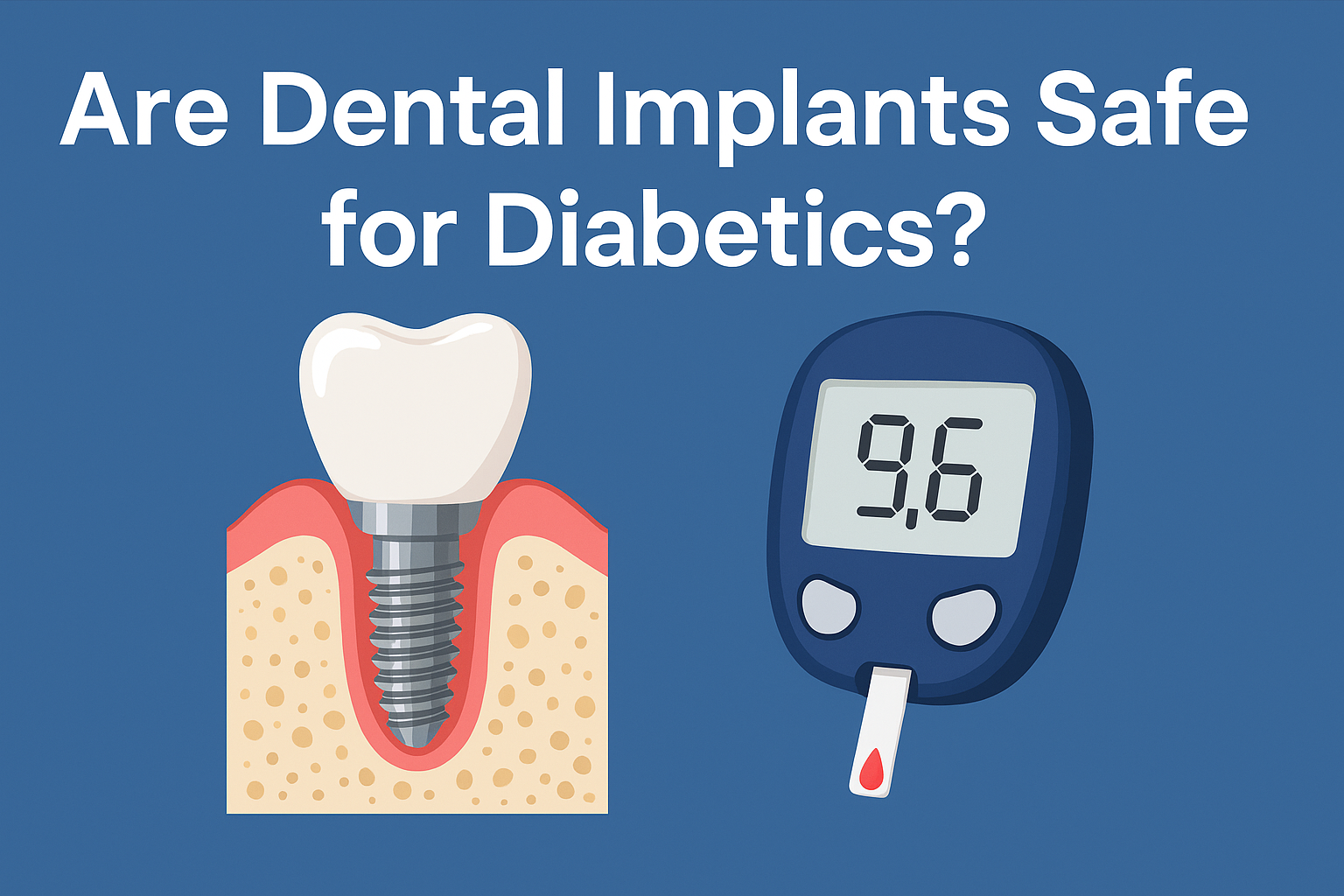
Are Dental Implants Safe for Diabetics
Dental implants have revolutionized tooth replacement, offering durability and a natural look. However, for people with diabetes, the question often arises — are dental implants safe for diabetics? This comprehensive guide delves deep into the relationship between diabetes and dental implants, highlighting considerations, risks, safety measures, and post-operative care.
🔹 Introduction: Diabetes and Oral Health
Diabetes affects your entire body — and your mouth is no exception. High blood sugar levels can impair healing, increase infection risk, and reduce bone quality, all of which are crucial factors for implant success. That’s why understanding the connection between dental implants and diabetes is essential before undergoing the procedure.
🔹 Types of Diabetes and Their Impact on Dental Implants
- Type 1 Diabetes: Autoimmune, often diagnosed young. Blood sugar control is more difficult, increasing implant failure risk if uncontrolled.
- Type 2 Diabetes: More common in adults. Implant success can be comparable to non-diabetics with good glycemic control.
- Gestational Diabetes: Temporary condition during pregnancy. Implants are usually postponed until post-pregnancy.
🔹 Glycemic Control: The Most Critical Factor
Well-controlled diabetics (HbA1c < 7%) are excellent candidates for dental implants, often achieving comparable success rates to non-diabetics.
Poorly controlled diabetics face:
- Increased risk of peri-implantitis
- Delayed healing and osseointegration
- Higher implant failure rates
🔸 Key Tip: Ensure glycemic control is stable at least 2–3 months before and after implant placement.
🔹 Osseointegration in Diabetics: Does It Differ?
Osseointegration is the process by which the implant fuses with jawbone. Diabetes may impair this due to:
- Microvascular complications
- Altered bone metabolism
- Reduced bone mineral density
Proper pre-operative evaluation and longer healing periods may be needed.
🔹 Peri-Implantitis Risk and Infection Susceptibility
Diabetics are prone to:
- Inflammation around the implant (peri-implant mucositis)
- Bone loss due to infection (peri-implantitis)
Prevention Strategies:
- Use of antibacterial mouth rinses
- Strict oral hygiene routine
- Regular dental checkups every 3–6 months
🔹 Success Rates of Dental Implants in Diabetics
Research shows:
- Controlled diabetics: Implant success rate ~90–95%
- Uncontrolled diabetics: Risk of failure increases by 2–3 times
📊 Factors Influencing Success in Diabetic Patients:
| Factor | Impact |
| Blood sugar control | Highest impact |
| Smoking | Increases failure risk |
| Oral hygiene | Critical |
| Periodontal status | Pre-existing gum disease raises risks |
| Bone density | May be compromised in long-standing diabetics |
🔹 Bone Grafting and Sinus Lift Considerations
In diabetics with bone loss, bone grafting may be required:
- Grafts heal more slowly
- Infection risk is higher
- May require longer healing phase before implant placement
🔹 Implant Material Considerations in Diabetics
- Titanium implants: Gold standard — biocompatible, well-researched.
- Zirconia implants: Considered hypoallergenic, less plaque retention — may be useful for diabetics with gum sensitivity or autoimmune tendencies.
🔹 Medication Interactions and Healing
Some diabetic medications (e.g. SGLT2 inhibitors) may alter healing dynamics. Always inform your dentist about:
- Current diabetic medications
- Blood pressure drugs
- Any steroid use (affects immunity)
🔹 Pre-Operative and Post-Operative Care for Diabetics
Before the Implant:
- HbA1c test
- Dental imaging & bone evaluation
- Periodontal therapy if needed
After the Implant:
- Antibiotics may be prescribed longer
- Avoid smoking
- Regular follow-ups with blood glucose monitoring
🔹 Alternative Options If Implants Aren’t Suitable
- Implant-supported dentures: Require fewer implants, potentially less invasive
- Removable partial dentures: For high-risk diabetics with bone issues
- Bridges: Non-surgical, but compromise neighboring teeth
✅ Conclusion: Are Dental Implants Safe for Diabetics?
Yes — dental implants can be safe and effective for diabetics, especially when blood sugar levels are well-controlled. With proper planning, infection prevention, and maintenance, diabetics can enjoy the same long-term benefits as non-diabetic patients. The key lies in close collaboration between your dentist, physician, and YOU.
“Looking for quality oral care products? Simply click on the ‘Shop’ menu item to explore our curated selection.”
Related Reads
Bridge vs Implant vs Denture: Which Tooth Replacement Option is Best?
Best Bridge Material for Front Teeth: A Complete Guide for Long-Lasting Smile
How Long Do Dental Bridges Last? Understanding Lifespan, Influencing Factors, and Maintenance Tips
How Long Do Dental Crowns Last? Lifespan, Factors & Care Tips
How Painful Is a Dental Implant? – Understanding the Procedure, Pain Levels, and Recovery
How Long Does It Take to Heal After a Dental Implant?
Mini Implants vs Full Implants: Complete Guide to Key Differences, Benefits, and Limitations
❓ 10 FAQs About Dental Implants and Diabetes
- Can Type 2 diabetics get dental implants?
Yes, if their blood sugar is well-controlled. - Is healing slower for diabetics after dental implants?
It can be, especially in uncontrolled diabetes. - Is there an HbA1c level considered too high for implants?
Yes, levels above 8.0% significantly increase failure risk. - Can dental implants worsen diabetes?
No, but any post-op infection may temporarily affect sugar levels. - Are antibiotics necessary for diabetic patients getting implants?
Often, yes — to reduce infection risk. - Can I get immediate implants if I’m diabetic?
Usually not recommended unless diabetes is well managed. - Are implant costs higher for diabetics?
No, but additional care and longer healing may add to the cost. - Is peri-implantitis common in diabetic patients?
More likely in poorly controlled diabetes. - Should diabetics use special mouthwash after implant surgery?
Yes, antiseptic rinses like chlorhexidine are often advised. - Can dental implants help with chewing problems caused by diabetes?
Yes, they restore full function, improving nutrition and overall health.
